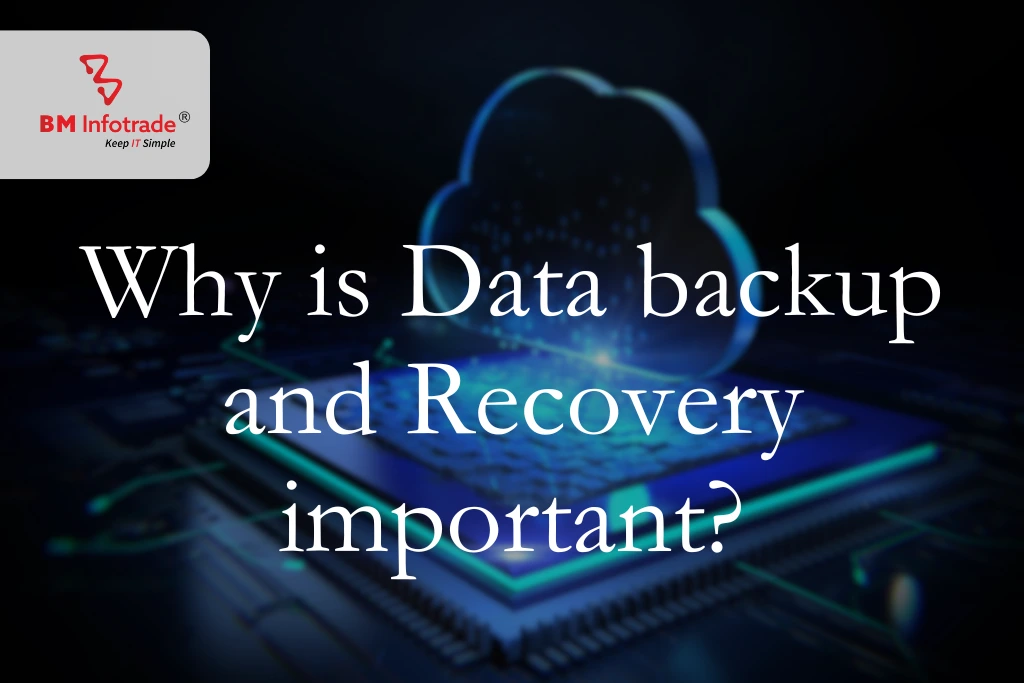Why is Data backup and recovery important?
In the event that these failures occur, Data backup and recovery can help you save time and money. The goal of the backup is to make a copy

Why is Data backup and recovery important?
Table of Contents
Backup always keep you safe and seals your success.
Data management is critically dependent on creating backups of collected data. The use of backups guards against human error, hardware malfunction, virus attacks, power outages, and natural disasters. In the event that these failures occur, Data backup and recovery can help you save time and money.
The importance of backup and recovery with backup meaning
The goal of Data backup and recovery is to make a copy of the data that can be recovered in the event that the primary data source fails. Primary data catastrophes can result from hardware or software malfunction, information corruption, or a human-caused event, such as a malicious attack (virus or malware), or unintentional deletion of data. To assist the business in recovering from an unforeseen event, backup copies allow data to be restored from a previous point in time.
To prevent the loss or corruption of records, it is crucial to store a copy of the records on a separate medium. This additional medium could be something as simple as an external drive or USB stick, or it could be something much larger like a disk storage device, cloud storage box, or tape drive. The trading medium could be close to the first data's location or far away. Having copies of information in distant locations can also be justified by the possibility of weather-related events.
To ensure satisfactory results, backup copies are regularly made in order to reduce the amount of data lost between backups. The capacity for statistics loss while recovering from a backup increases as more time elapses between backup copies. The ability to restore to a point in time that has not been impacted by malicious attacks or data corruption is made possible by maintaining multiple copies of the data.
Read More:- The Importance of Backup and Recovery.
What are the types of backup and recovery in DBMS?

Complete backups:
Full Data backup and recovery are pretty much what they sound like; you are making a copy of all the data in your environment or a specific area of the environment. Full backups are the easiest to complete, but they are also the most expensive and take up the most space in the garage.
Differential Backups:
These backups create copies of all the documents that have been added to or modified since the last full backup. Differential backups save time and money because they don't backup any files that have already been saved in the final full backup. Due to the need for access, the disadvantage is that it takes longer to recover from differential backups.
Backups that are incremental only cover the information that has changed since the last backup of any kind. Incremental backups are similar to differential backups in this regard. Whether it becomes a full backup, differential backup, or incremental backup, this method doesn't rely. This is in contrast to a differential backup, which would include all files modified since the final full backup.

Prevention of Data Loss
Everybody has experienced or heard about the tragic lack of statistics. The primary goal of data backup is to store crucial files in case of a computer crash or hard drive failure.
Operation
In the event that the original backups experience data corruption or severe power outages, additional record backups are required. This option is best carried out using the cloud or an offsite storage facility. It's crucial to have extra backups in case of natural or artificial failures. Storms and conflict may cause servers and computers to be destroyed by fires and floods.
Relationship with the Client
Information that has been saved helps with customer dating management, which enhances advertising and revenue. Additionally, the value and consideration of a business are increased by stored customer information.
Gain in Competition
Due to the large number of businesses that neglect to back up important information, saved business data can be a competitive advantage.
Enhanced Productivity
With the help of current sponsored up documents, businesses increase productivity by cutting down on wasted time. A more effective plan can be developed by comparing historical and contemporary research thanks to archived documents.
No Time Wasted
Data backup and recovery uses repetition prevention to cut down on "wasted time." Personnel no longer need to rewrite reviews as a result.
Backup is essential for data security. A regular data backup, preferably daily or weekly, protects your critical files from situations where data loss is unavoidable due to frequent occurrences like system failure, malware infection, hard drive corruption, etc.
According to a survey, from 65% in 2008 to 76% in 2018, the proportion of users who backup their data has steadily increased. However, a sizable portion of users, or 43%, continue to rely on annual backups.
The yearly backups are significantly spaced apart, rendering them useless. As a result, after a data loss, the annual backups frequently fail to restore all necessary files. Only 24% of users don't even consider making a backup. And only 6% of users regularly backup their data.
Read More:- Database Management System
Conclusion
Data security should be given top priority. Any type of data loss can increase customer complaints and legal action. To lessen the likelihood of data loss or damage, many safeguards are available. The strict implementation of ongoing Data backup and recovery is a wise strategy.







Anshul Goyal
Group BDM at B M Infotrade | 11+ years Experience | Business Consultancy | Providing solutions in Cyber Security, Data Analytics, Cloud Computing, Digitization, Data and AI | IT Sales Leader